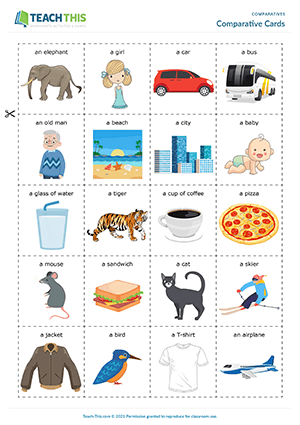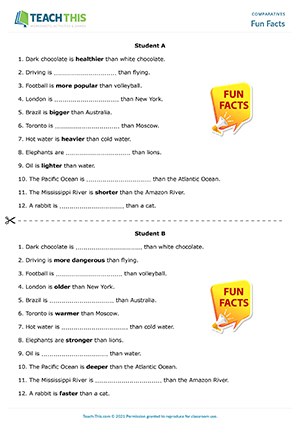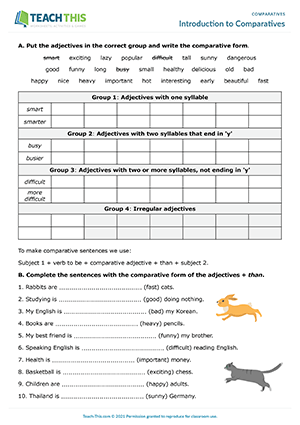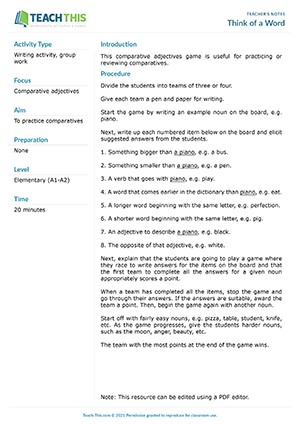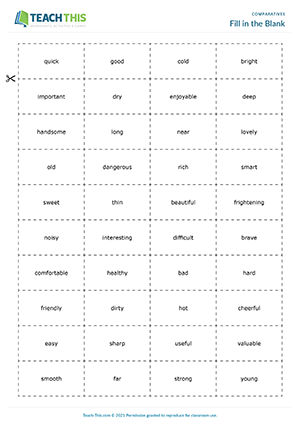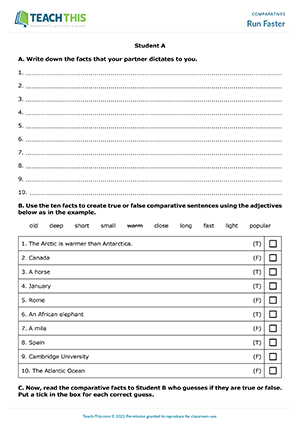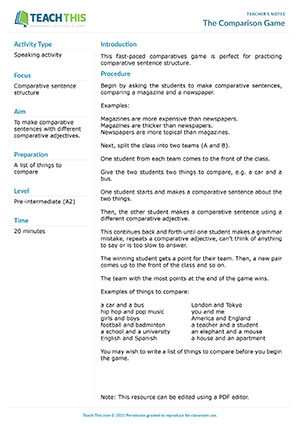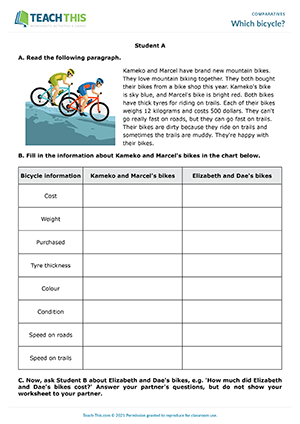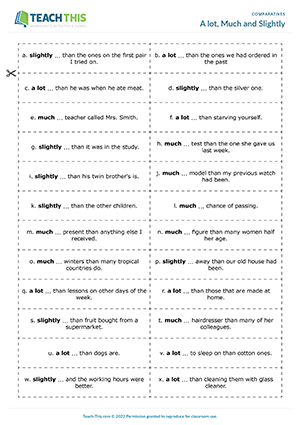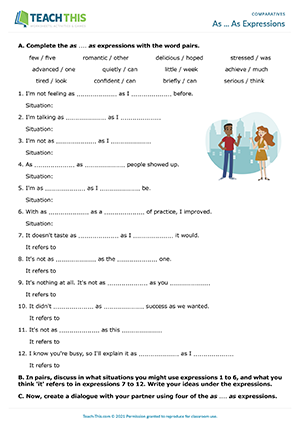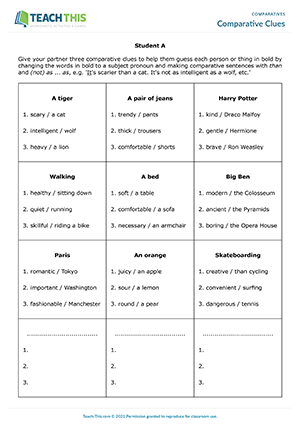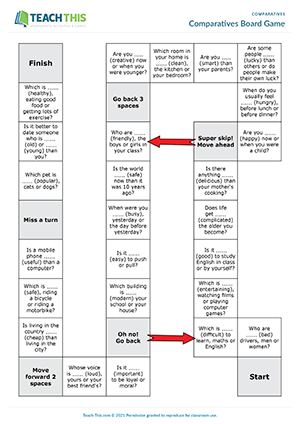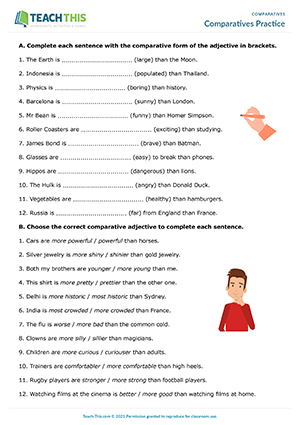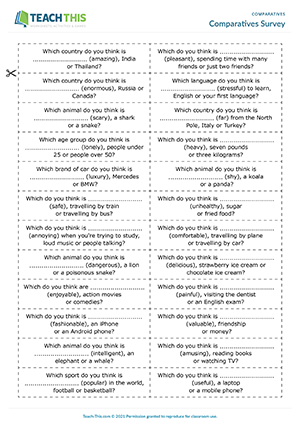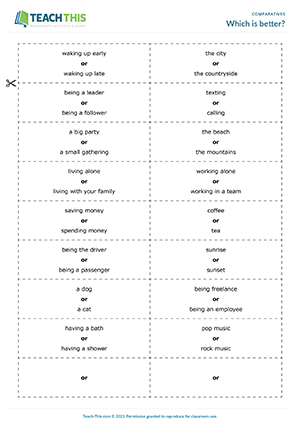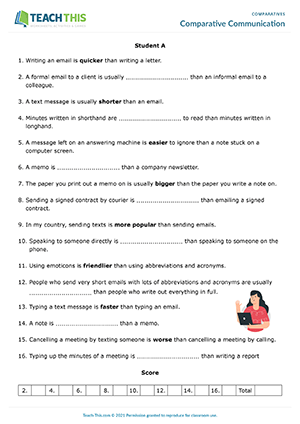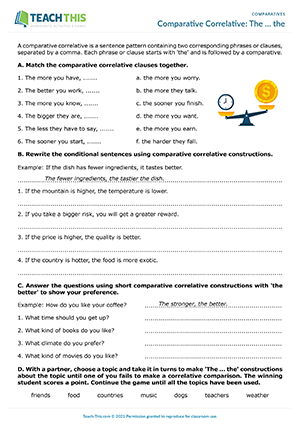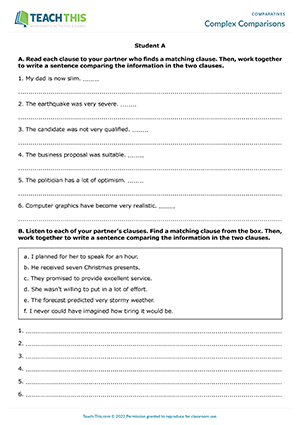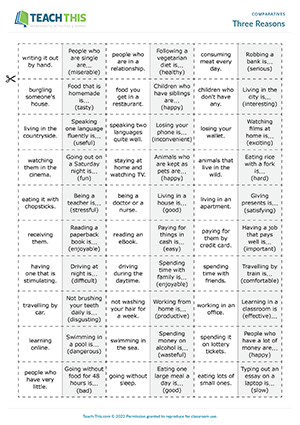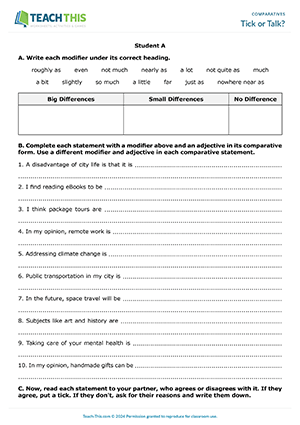In this free comparatives game, students link nouns together by making comparative sentences with than. One student goes first and puts one of their noun cards face-up on the table. Students then take turns putting down a noun card and making a comparative sentence with than, linking the two nouns together, e.g. 'A car is faster than a bus.' 'A bus is bigger than an elephant.' Students can put a card down either before or after the card or card chain on the table, similar to dominoes. Each time a student puts down a card they must use a different comparative adjective. If a student makes a grammar mistake or can't think of a way to link two noun cards together, they miss a turn. The first student to get rid of all their cards wins the game. Finally, pairs write out the comparative sentences they made and then read them out to the class.
In this fun comparative adjectives game, students guess missing comparative adjectives in sentences about fun facts. Both students have the same sentences, but where they have a comparative adjective in bold, their partner has a gap and vice versa. Student B starts by reading the first sentence and guessing the missing comparative adjective. Student B has three chances to guess the comparative adjective. If Student B’s comparative adjective is the same as what Student A has in bold on their worksheet, Student B scores three points and writes the comparative adjective in the gap. If the guess is wrong, Student B tries again for two points and then for one point. Then, it's Student A's turn to guess the missing comparative adjective in the second sentence, and so on. The student with the most points at the end of the game wins.
This comprehensive comparatives worksheet helps students learn and practice comparative adjectives and comparative sentences with than. Students begin by categorizing adjectives and writing them in their comparative forms. Next, students complete sentences with the comparative form of the adjectives in brackets + than. Students then put words in order to form comparative sentences. Lastly, students complete sentences with the correct comparative form.
Here is an enjoyable comparatives game to play in class. Write a noun on the board, e.g. piano. Teams then race to write down something bigger and smaller than the noun, a verb that goes with the noun, a word that comes earlier in the dictionary, a longer and a shorter word beginning with the same letter as the noun, an adjective to describe the noun and the opposite of that adjective. When a team has completed all the items, stop the game and check their answers. If the answers are appropriate, the team scores a point. The game continues with a different noun being used each round. The team with the most points at the end of the game wins.
In this entertaining comparatives game, students race to guess missing comparative adjectives in sentences. Students take turns picking up a card and making a sentence using the comparative form of the adjective on the card, but instead of saying the comparative adjective, the student uses the word 'blank', e.g. 'Cars are 'blank' than bicycles.' The other group members then race to guess the missing comparative adjective. The first student to guess correctly wins and keeps the card. The student with the most cards at the end of the game is the winner.
In this free comparatives running dictation activity, students dictate sentences and then use them to make true or false comparative facts, which they use in a guessing game. Working with a student from the same group, one student is the writer, and the other is the reader. The reader runs to 'Set A or B' sentences on the wall outside the classroom, reads the first fact, runs back and dictates it to their partner who writes it down. This continues until all ten facts have been fully dictated. Students then swap roles and the process is repeated. Pairs then compare their facts to make sure they are the same. Next, students use the ten facts to create true or false comparative sentences using the adjectives shown. Finally, students pair up with someone from the other group and take turns reading their comparative facts to their partner, who guesses if they are true or false. For each correct guess, students put a tick. The student with the most correct guesses wins.
This fast-paced comparison game is perfect for practicing comparative sentence structure. A student from each team comes to the front of the class. Give the two students two things to compare, e.g. a car and a bus. One student starts and makes a comparative sentence about the two things, e.g. 'A car is faster than a bus.' Then, the other student makes a comparative sentence using a different comparative adjective, e.g. 'A bus is bigger than a car.' This continues back and forth until one student makes a grammar mistake, repeats a comparative adjective, can't think of anything to say or is too slow to answer. The winning student scores a point for their team. Then, a new pair comes up to the front of the class, and so on. The team with the most points at the end of the game wins.
Here is an imaginative comparatives information gap activity for students to do in class. In the activity, students compare information about bicycles using comparatives. In two groups, students read the paragraph on the worksheet and then fill in a chart with bicycle information from the text. Next, students pair up with someone from the other group. Students ask their partner about the other people's bikes and complete the chart with the information. Students then use the bike information to make comparative sentences, comparing the bikes. Next, students unscramble comparative sentences using the bicycle information to help them. Finally, students write true sentences to compare the bicycles using the comparative forms of the adjectives on the worksheet.
In this creative making comparisons game, students match sentence halves together and connect them with the modifiers a lot, much or slightly and suitable comparative adjectives. In groups, players take turns picking up a sentence beginning card, reading it aloud and placing it face-up on the desk. All the players then check their cards to see if they have a matching ending. If a player does, they read it aloud, connecting the sentence using the modifier in bold and a comparative adjective they think is suitable. If the other players agree the ending matches and the comparative adjective is appropriate, the two cards are removed from the game. If a matching card is played but the players believe it has been read out incorrectly or the comparative adjective is unsuitable, the player takes back their card, and the beginning card is put at the bottom of the pile. If the other players think the ending does not match, the player takes back their card and the game continues. The first player to get rid of all their cards wins the game.
In this useful comparative expressions activity, students learn common comparative expressions with as ... as. First, students complete 12 comparative as ... as expressions on their worksheet with word pairs. Next, in pairs, students discuss in what situations they might use expressions 1 to 6, and what they think 'it' refers to in expressions 7 to 12, writing their ideas under the expressions. When everyone has finished, run through the students' ideas and answers. Afterwards, each pair creates a dialogue using four of the comparative expressions from the worksheet and presents it to the class.
In this productive comparatives game, students give comparative clues to a partner who tries to guess who or what is being described. First, in pairs, students complete three empty boxes at the bottom of the worksheet with their own words and comparative clues. Students then take turns giving their partner three comparative clues to help them guess each person or thing in bold. They do this by changing the words in bold to a subject pronoun and making comparative sentences with than and (not) as ... as, e.g. 'It's scarier than a cat. It's not as intelligent as a wolf, etc.' After the three clues have been given, their partner has one chance to guess the answer. Students score one point for each correct guess. The student with the most points at the end of the game is the winner. Finally, students read the clues they created themselves to the class, who tries to guess who or what is being described.
In this free comparatives board game, students change adjectives into their comparative forms and then use the comparative adjectives to ask and answer conversation questions. Students take turns rolling the dice and moving their counter along the board. When a student lands on a square, they change the adjective in the conversation question into its comparative form and then ask the question to their partner. Their partner then answers the question in sentence form, explaining any reasons in more detail. The two students continue taking turns to asking and answering the comparative conversation questions until one student reaches the finish. That student wins the game.
Here is an insightful comparatives worksheet to help students practice comparative adjectives and the as ... as comparative structure. First, students complete sentences with the comparative form of the adjectives in brackets. Next, students choose the correct comparative adjective to complete each sentence. Students then use the as ... as structure to write negative comparative sentences that have the same meaning as the sentences shown. Lastly, students use prompts to write positive or negative as ... as comparative sentences that give their opinion.
In this interesting comparatives activity, students conduct a class survey where they ask and answer questions using comparative adjectives. Students begin by completing a survey question on a card with the comparative form of the adjective in brackets. Students then go around the class asking the question on their card and recording their classmates' answers on the back, e.g. 'Which country do you think is more amazing, India or Thailand?' Students must answer each question in sentence form, e.g. 'I think Thailand is more amazing than India.' When the students have spoken to everyone in the class, they write a short summary of their survey results and report back to the class on their findings.
Here is an engaging comparatives speaking activity for students to do in class. In the activity, students use comparatives to say which of two things they think is better and why. Students take turns picking up a card and asking the other students in the group a Which is better, ... or ...? Why? question from the prompt on the card, e.g. 'Which is better, waking up early or waking up late? Why?' Each student then answers the question using comparative forms. After each student has given their answer, students discuss the topic before moving on to the next card. If a student picks up an 'or' card, they can ask any 'Which is better...?' question they like. When the students have finished, they give feedback to the class on which things they think are better and why.
Here is a comparative adjectives guessing game for Business English students or adults to play in class on the topic of communication. Both students have the same sentences on their worksheet, but where one student has a comparative adjective in bold, their partner has a gap and vice-versa. Student A starts by reading the first sentence to their partner and guessing the missing comparative adjective. If the comparative adjective is the same as what Student B has in bold on their worksheet, Student A scores three points and writes the comparative adjective in the gap. If the guess is wrong, Student A tries again for two points and then for one point. It's then Student B's turn to guess the missing comparative adjective in the second sentence, and so on. The student with the most points at the end of the game wins. Afterwards, in pairs, students discuss whether they agree or disagree with each sentence and then give feedback to the class.
This detailed correlative comparisons worksheet helps students practice comparative correlative constructions. Students start by matching comparative correlative clauses together. Next, students rewrite conditional sentences using comparative correlative constructions. After that, students answer questions using short comparative correlative constructions with 'the better' to show their preference. Lastly, in pairs, students choose a topic and take turns making The ... the constructions about the topic until one of them fails to make a correlative comparison. The winning student scores a point. The student with the most points at the end of the game wins.
In this challenging comparatives activity, students match related clauses and write sentences making complex comparisons between them. In pairs, students match each clause on their worksheet with a related clause from a box on their partner's worksheet. When they have found a matching pair of clauses, students work together to write a new sentence comparing the information in the two clauses. When the pairs have written all their sentences, review them together as a class.
In this creative making comparisons game, students make complex comparisons between verb and noun phrases in order to express an opinion. The first player tries to make a sentence by placing one of their dominoes at either end of the domino on the table, matching the beginning half of a sentence with an ending or vice-versa. If the player matches two sentence halves correctly, they use the adjective in brackets to make a comparative sentence with as ... as or more/less ... than that best expresses their own opinion, e.g. 'Learning in a classroom is not as difficult as learning online.' The player then has 30 seconds to give three reasons to back up their opinion. If the player is successful, the domino remains in place, and it's the next students turn to play. If the player is unsuccessful or makes a grammatically incorrect sentence, they take back their domino and play passes to the next student. The first player to get rid of all their dominoes wins the game.
In this rewarding modifiers and comparatives activity, students complete comparative statements with a variety of modifiers and adjectives and then talk about their ideas. First, in two groups, students write each modifier under a suitable heading: big differences, small differences, or no difference. Working together, students then use their own ideas to complete each statement with a modifier and an adjective in its comparative form, using a different modifier and adjective in each comparative statement, e.g. 'Going to the beach is far better than going to the mountains.' Next, students pair up with someone from the other group and take turns reading each statement to their partner, who agrees or disagrees with it. If their partner agrees, the student puts a tick next to the statement. If they disagree, the student asks for their reasons and writes them down. Finally, students report back to the class on which statements they and their partner disagreed with and why.
Latest Free
Resources
- The Bus Stop
Getting Around (B1)
Date Added: 1st of October
- Study Skills Showdown
Study Skills (B2)
Date Added: 10th of September
- Everyday Objects Bingo
Everyday Objects (A1-A2)
Date Added: 25th of August
- Action Verb Races
Actions (A1-A2)
Date Added: 18th of August
- Birthday Basics
Birthdays (A1-A2)
Date Added: 8th of August
Latest Member
Resources
- Casual Greetings
Greetings and Introductions (B2)
Date Added: 22nd of October
- Identifying and Clarifying Problems
Dealing with Problems (B2)
Date Added: 22nd of October
- What if we tried...?
Dealing with Problems (B2)
Date Added: 22nd of October
- Suitable Excuses
Making Excuses (B2)
Date Added: 21st of October
- Superlatives Showdown
Superlatives (A1-A2)
Date Added: 21st of October



